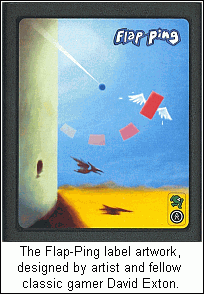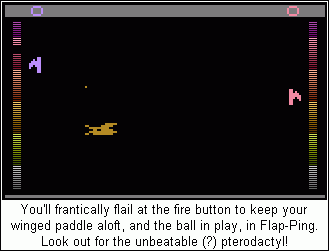GRB: Why
did you decide to develop games for orphaned consoles like the
Atari 2600, instead of today's more powerful computers and
game systems?
 ISRAEL: For starters, most modern
consoles are closed; ever since the post-crash NES days
companies have wanted to keep a tight reign on third parties,
and a really good homebrew is pretty indistinguishable from a
traditional third-party effort. But also, the 2600 taps deeply into
my youth... as a kid, I never thought I'd be in a position to
be able to make original games for the system that I loved
playing so much...
ISRAEL: For starters, most modern
consoles are closed; ever since the post-crash NES days
companies have wanted to keep a tight reign on third parties,
and a really good homebrew is pretty indistinguishable from a
traditional third-party effort. But also, the 2600 taps deeply into
my youth... as a kid, I never thought I'd be in a position to
be able to make original games for the system that I loved
playing so much...
GRB:
What's the appeal of developing
software for the Atari 2600 in particular? What do you think
draws so many homebrew developers to this humble
system?
ISRAEL:
For starters, there's something "cooler" about
coding for a console than for, say, an old home computer: I
mean a lot of us coded something in BASIC back in the day, but
there's something about the physical aspect of having an
actual cartridge of your work.
Some people might be attracted to the
strength of the developer community for the 2600 on AtariAge
and the [stella] mailing list, other people groove on the
sheer challenge of working within the system's
limitations.
Of course, those limitations have a
silver lining in terms of diminished expectations: you're back
in the days of one man shows, where a talented developer can
do a passable job of the graphical and musical
aspects.
GRB:
What tools do you use to create your
games, and what skills and experience are necessary to make
software for the system?
ISRAEL:
The core is just a simple text editor
(Textpad, in my case) and DASM, which is pretty much the
standard Assembler, and then of course one of the excellent
emulators... Z26 was my favorite during development. I
supplemented those with some Perl scripts I coded myself for
managing files, and later made some javascript editors that
are available at http://alienbill.com/2600/ Finally I used a
supercharger to load my work in progress into an actual
Atari.
I'm a programmer by trade, but not in
languages as low level as what the Atari uses. (At least
before Batari BASIC, which is a different story...) I wouldn't
recommend Atari assembly programming to someone who has never
coded in a higher level language, because I think you need a
well-developed ability to break a task into a small series of
steps that a computer can understand. Also, some basic skills
in art and sound can help too...I've been a doodler all my
life, and I used to play brass instruments and take some music
theory, and both of those helped with JoustPong (especially
for the title screen music, which I'm proud of even though
it's terribly simple.)
GRB:
You hit a legal brick wall when
designing your game Flap-Ping (formerly known as Joust Pong).
Please describe the situation and how you managed to get the
project back on track.
ISRAEL:
Well, the brick wall came after development
was finished and JoustPong released. AtariAge got notified
about a number of finished products and works in progress by
the latest holder of the Atari name, formerly Infogrames. I
would have thought they had noticed that some of JoustPong's
graphics and sound was very similar to their own port of
Joust, but it turns out they feel they have exclusive use of
the word "Pong", which seems kind of extreme...given how many
Google hits there are on the word before you get into anything
specifically Atari related, it seems to have become a bit of a
generic term already. Still, it didn't seem worth fighting too
hard, especially since Thomas Jentzsch suggested the very
clever "Flap-Ping" replacement. I redid the title screen and
Dave "Liveinabin" Exton made bit of cover art for
it.
GRB: How
do threats of legal action affect the reputation of large
corporations like Atari?
ISRAEL:
Atari, in its current form, is not
well-regarded. Many old school Atari fans see 'em as Atari in
name only. especially given their limited success in the
modern gaming arena. I think this crackdown was very bad karma
for them in the hardcore retro community, but the effect was
small (along with the community!) relative to the way they've
put out some terribly-under-debugged and otherwise lacking
games lately.
 GRB:
What compromises can major software
developers like Atari make with the designers of fan-made
projects like Flap-Ping?
GRB:
What compromises can major software
developers like Atari make with the designers of fan-made
projects like Flap-Ping?
ISRAEL:
It would be nice if they were better at
discerning smalltime efforts that will sell at best a hundred
copies vs. more corporate projects. I think most homebrewers
would be happy to put in whatever disclaimers or copyright
notices Atari wanted to demonstrate that ultimately they have
legitimate Intellectual Property claims, but Atari seems to
insist on viewing the world in black and white
terms.
GRB:
Why are there so many remakes and
tributes of classic games in the homebrew community, and so
few original efforts?
ISRAEL:
Well, probably for the same reason there are
so many sequels in the mainstream gaming market, or even in
Hollywood... sometimes it's useful to tap into a known
quantity. Though I don't think the situation is quite as bad
as you imply, at least for the 2600.
Homebrews are often exercises in
nostalgia, and some of our nostalgia is tied in with specific
games and characters. You also see some interesting playing
around with these characters and concepts in the Hacks
hobbyist groups, where they take the basic code and modify the
graphics, sound, and even gameplay to fit certain parameters.
There's a lot of creativity there...sometimes more than in the
regular homebrew groups. Other developers do it for
pride, to show that the 2600 could've done a certain game, if
only people had thought of it or had the skill.
JoustPong was a kind of funny case, a
hybrid of a game (Pong) and a certain physics mechanic
(Joust). I think it's the best of both worlds, original
gameplay in a nostalgic shell. It's also a hell of a
deathmatch, if I do say so myself, and one of the most complex
games around that is controlled by a single clicking
button.
GRB:
What can be done to encourage original output from
independent game developers?
ISRAEL: Well,
sometimes even the "less original" output is pretty cool, kind
of expanding the universes of the previous titles. But overall...well, supporting
with dollars is always good, but probably less important than
support on forums and that kind of demonstrated enthusiasm.
After all, homebrewers generally do it for the love and the
attention, and not the money...by the time any money is coming
in, the work has been done already.
Of course the support sites like
AtariAge offer, where they work with developers to produce the
physical cartridges, is invaluable to the hobby.
And it would be nice if more
companies were willing to open up their platforms, but some
(especially Sony!) seem dedicated to the principle that
Enduser Creativity is EVIL and devices must only be used in
ways the original maker intended and every game for them has
to go through channels. Their ongoing efforts to lock
hobbyists out of their PSP platform is dumber and more
damaging than most anything Atari's lawyers have cooked
up.
Special thanks to Atari Age for
the scan of the Flap-Ping label artwork.



